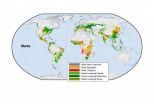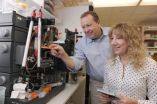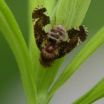(Press-News.org) MINNEAPOLIS / ST. PAUL (12/18/2012) —The Green Revolution has stagnated for key food crops in many regions of the world, according to a study published in the Dec. 18 issue of Nature Communications by scientists with the University of Minnesota's Institute on the Environment and McGill University in Montreal, Canada.
Led by IonE research fellow Deepak Ray, the study team developed geographically detailed maps of annual crop harvested areas and yields of maize (corn), rice, wheat and soybeans from 1961 to 2008. It found that although virtually all regions showed a yield increase sometime during that period, in 24 to 39 percent of the harvested areas (depending on the crop) yield plateaued or outright declined in recent years. Among the top crop-producing nations, vast areas of two of the most populous – China and India – are witnessing especially concerning stagnation or decline in yield.
"This study clearly delineates areas where yields for important food crops are stagnating, declining, or never improved, as well areas where yields are still rapidly improving," Ray says. "As a result, it both sounds the alert for where we must shift our course if we are to feed a growing population in the decades to come, and points to positive examples to emulate."
Interestingly, the researchers found that yields of wheat and rice – two crops that are largely used as food crops, and which supply roughly half of the world's dietary calories – are declining across a higher percentage of cropland than those of corn and soybean, which are used largely to produce meat or biofuels.
"This finding is particularly troubling because it suggests that we have preferentially focused our crop improvement efforts on feeding animals and cars, as we have largely ignored investments in wheat and rice, crops that feed people and are the basis of food security in much of the world," said study co-author and IonE director Jonathan Foley, professor and McKnight Presidential Chair in the College of Biological Sciences. "How can we meet the growing needs of feeding people in the future if one-third of our cropland areas, in our most important crops, are not improving in yield any more?"
The paper suggests two actions based on its findings. First, it recommends working to maintain the positive trajectory for the 61 to 76 percent of croplands where yield is still climbing. Second, it encourages crop-producing regions around the world to look at their yield trends and those of others to identify what's working and what might be improved.
"Previous research suggests that many factors work together to limit yield growth, from cultivation practices to pests to a need for improved seeds," Ray said. "What this paper does is provide concrete, detailed information policy makers can use to identify regions where yield growth has stagnated or reversed, figure out what limiting factors are at play, then work to turn that trend around."
INFORMATION:
The University of Minnesota's Institute on the Environment seeks lasting solutions to Earth's biggest challenges through research, partnerships and leadership development. For more information, visit environment.umn.edu.
At the University of Minnesota, researchers are working to secure our global food supply. These game-changing efforts are the impetus behind MnDRIVE, the university's proposal for a new, ongoing partnership with the state to enhance Discovery, Research, InnoVation and Economic development. For more information, visit www.govrelations.umn.edu/biennial-budget.html.
The Green Revolution is wilting
New Nature Communications paper shows yields have plateaued or dropped in many places for world’s most important crops
2012-12-18
ELSE PRESS RELEASES FROM THIS DATE:
USC study: Internet outages in the US doubled during Hurricane Sandy
2012-12-18
USC scientists who track Internet outages throughout the world noted a spike in outages due to Hurricane Sandy, with almost twice as much of the Internet down in the U.S. as usual.
Previous research by this team has shown that on any given day, about 0.3 percent of the Internet is down for one reason or another. Just before Hurricane Sandy hit the East Coast, that number was around 0.2 percent in the U.S. (pretty good, by global standards) – but once the storm made landfall, it jumped to 0.43 percent and took about four days to return to normal, according to a new report ...
Study: Curbing car travel could be as effective as cutting calories
2012-12-18
CHAMPAIGN, Ill. — Those considering how to maintain a healthy weight during holiday festivities, or looking ahead to New Year's resolutions, may want to think twice before reaching for traditional staples like cookies or candy – or the car keys.
A new study by University of Illinois researchers, led by computer science and mathematics professor Sheldon H. Jacobson, suggests that both daily automobile travel and calories consumed are related to body weight, and reducing either one, even by a small amount, correlates with a reduction in body mass index (BMI).
"We're saying ...
Researchers find model system to study promising cancer drug
2012-12-18
Researchers have found that the budding yeast (Saccharomyces cerevisiae) is an acceptable model system to study KP1019, an anti-cancer drug that uses ruthenium, a rare metal, a new study found. Researchers had previously been interested in studying KP1019 because it is believed to cause cancer cell death and is not known to have negative secondary side effects for healthy tissues.
"We wanted to learn more about how KP1019 works on a cellular level, and how the drug acts on yeast cells can be indicative of how it will perform on mammalian cells," said Pamela Hanson, ...
Chronic worriers at higher risk for PTSD
2012-12-18
EAST LANSING, Mich. --- People who worry constantly are at greater risk for post-traumatic stress disorder, according to new Michigan State University research published in the journal Psychological Medicine.
Many people experience traumatic events such as the death of a loved one, being assaulted or witnessing violence, but only a small minority develop PTSD, said study author Naomi Breslau, a professor of epidemiology at MSU.
"So the question is, 'What's the difference between those who develop PTSD and the majority who don't,'" Breslau said. "This paper says people ...
Hybrid tunnel may help guide severed nerves back to health
2012-12-18
UNIVERSITY PARK, Pa. -- Building a tunnel made up of both hard and soft materials to guide the reconnection of severed nerve endings may be the first step toward helping patients who have suffered extensive nerve trauma regain feeling and movement, according to a team of biomedical engineers.
"Nerve injury in both central nervous system and peripheral nervous system is a major health problem," said Mohammad Reza Abidian, assistant professor of biomedical engineering, Penn State. "According to the National Spinal Cord Injury Statistical Center, there are approximately ...
Researchers identify role for protein linked to obesity, type 2 diabetes
2012-12-18
DALLAS – Dec. 17, 2012 – Researchers at UT Southwestern Medical Center have taken another step toward better understanding the metabolic functions of obesity and its connection to type 2 diabetes.
Dr. Philipp Scherer, Director of the Touchstone Center for Diabetes Research at UT Southwestern, led a group of researchers in a recent multicenter study published in Nature Medicine that successfully identified ways to manipulate the protein mitoNEET. This is the first time the protein has been effectively altered to expand fat tissue in a way that allows subjects – in this ...
EARTH: Antarctic meteorite hunters
2012-12-18
Alexandria, VA – For more than 35 years, scientists from the Antarctic Search for Meteorites (ANSMET) program have been scouring glacial landscapes in search of meteorites. Since 1976, teams of physicists, meteorite specialists, and mountaineers have recovered thousands of untouched specimens from meteoroids, the moon and even Mars. Despite subzero temperatures and razor-sharp winds, scientists are lining up for the chance to experience the ultimate hunt for alien objects in the alien environment.
ANSMET teams either conduct systematic searches of a region or work as ...
Plant sniffs out danger to prepare defenses against pesky insect
2012-12-18
UNIVERSITY PARK, Pa. -- A plant may start to prime its defenses as soon as it gets a whiff of a male fly searching for a mate, according to Penn State entomologists.
Once tall goldenrod plants smell a sex attractant emitted by true fruit fly males, they appear to prepare chemical defenses that make them less appealing to female flies that could damage the plants by depositing eggs on them, the researchers said.
"It's become increasingly clear in recent years that plants are responsive to odors," said Mark Mescher, assistant professor of entomology. "But previous examples ...
AGU: Journal highlights 17 Dec., 2012
2012-12-18
Highlights, including authors and their institutions
The following highlights summarize research papers that have been recently
published in Geophysical Research Letters (GRL).
In this release:
1. First satellite detection of volcanogenic carbon monoxide
2. Antarctic sea ice thickness affects algae populations
3. Central European Summer Temperature Variability to Increase
4. Global ocean salinity changing due to anthropogenic climate change
5. Chamber measurements find plants potentially important methane sink
6. Low-frequency radio emissions from high-altitude ...
Can instilling racial pride in black teens lead to better educational outcomes?
2012-12-18
PITTSBURGH—African American adolescents tend to have more success in school if their parents instill in them a sense of racial pride, reducing their vulnerability to the effects of racial discrimination from teachers and peers.
This is the conclusion of a University of Pittsburgh study published this fall in the journal Child Development. Titled "Parental Racial Socialization as a Moderator of the Effects of Racial Discrimination on Educational Success Among African American Adolescents," the research article shows that when African American parents use racial socialization—talking ...
LAST 30 PRESS RELEASES:
Globe-trotting ancient ‘sea-salamander’ fossils rediscovered from Australia’s dawn of the Age of Dinosaurs
Roadmap for Europe’s biodiversity monitoring system
Novel camel antimicrobial peptides show promise against drug-resistant bacteria
Scientists discover why we know when to stop scratching an itch
A hidden reason inner ear cells die – and what it means for preventing hearing loss
Researchers discover how tuberculosis bacteria use a “stealth” mechanism to evade the immune system
New microscopy technique lets scientists see cells in unprecedented detail and color
Sometimes less is more: Scientists rethink how to pack medicine into tiny delivery capsules
Scientists build low-cost microscope to study living cells in zero gravity
The Biophysical Journal names Denis V. Titov the 2025 Paper of the Year-Early Career Investigator awardee
Scientists show how your body senses cold—and why menthol feels cool
Scientists deliver new molecule for getting DNA into cells
Study reveals insights about brain regions linked to OCD, informing potential treatments
Does ocean saltiness influence El Niño?
2026 Young Investigators: ONR celebrates new talent tackling warfighter challenges
Genetics help explain who gets the ‘telltale tingle’ from music, art and literature
Many Americans misunderstand medical aid in dying laws
Researchers publish landmark infectious disease study in ‘Science’
New NSF award supports innovative role-playing game approach to strengthening research security in academia
Kumar named to ACMA Emerging Leaders Program for 2026
AI language models could transform aquatic environmental risk assessment
New isotope tools reveal hidden pathways reshaping the global nitrogen cycle
Study reveals how antibiotic structure controls removal from water using biochar
Why chronic pain lasts longer in women: Immune cells offer clues
Toxic exposure creates epigenetic disease risk over 20 generations
More time spent on social media linked to steroid use intentions among boys and men
New study suggests a “kick it while it’s down” approach to cancer treatment could improve cure rates
Milken Institute, Ann Theodore Foundation launch new grant to support clinical trial for potential sarcoidosis treatment
New strategies boost effectiveness of CAR-NK therapy against cancer
Study: Adolescent cannabis use linked to doubling risk of psychotic and bipolar disorders
[Press-News.org] The Green Revolution is wiltingNew Nature Communications paper shows yields have plateaued or dropped in many places for world’s most important crops



